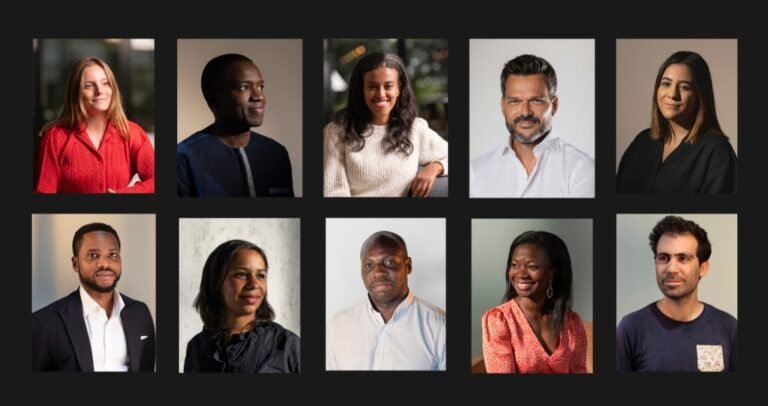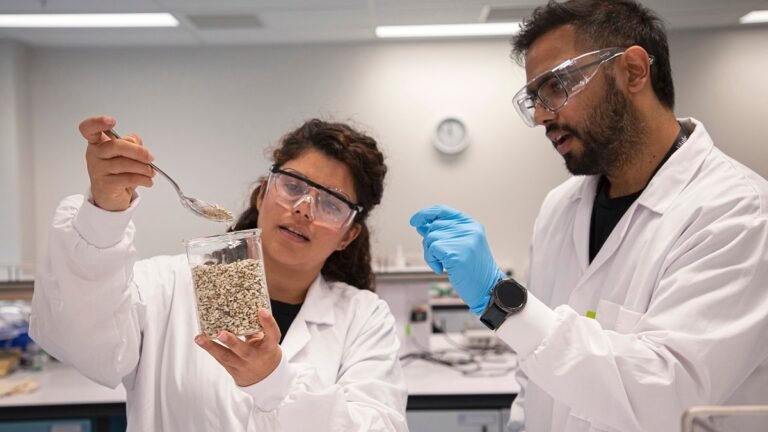
Food tech investment may have declined along with overall venture capital, but Bluestein Ventures is not letting that slow it down.
The Chicago-based early-stage venture capital firm closed on $45 million in capital commitments for its Fund III.
Andrew Bluestein, co-managing partner of Bluestein Ventures, founded the firm in 2014 and brought on Ashley Hartman, also co-managing partner, eight years ago.
They join other venture capital firms, like Kost Capital, Supply Change Capital and Joyful Ventures, that have recently raised new funds to invest in food tech.
“When we started Bluestein Ventures, people would ask us why we were investing in food,” Bluestein told TechCrunch.

State of venture investments in India, according to Lightspeed Lightspeed partners examine right-sizing VC funds in India, spectrum of startup investing and the country's prospects in the global AI race.
Over 150 investors, including Singapore’s sovereign fund Temasek and Malaysia’s Khazanah, gathered at Mumbai’s five-star Trident Oberoi hotel on a recent Friday for venture firm Lightspeed India Partners’ “Lift Off” summit.
In 2021, $33 billion of venture capital (early and late stage) was invested in India.
So 2023 is also not necessarily reflective of the venture market opportunity in India,” he added.
“We had a lot of funds not based in India but investing in India because of the opportunity the country offered to them outside their own.

Partech closes its second Africa fund at $300M+ to invest from seed to Series CPartech has closed its second Africa fund, Partech Africa II, at €280 million ($300 million+), just one year after reaching its first close.
Amidst a backdrop of global VCs and institutional investors pulling back from Africa, Partech Africa’s recent fund closure is significant.
However, he clarified that the firm will deploy the majority of its second fund between Series A and B rounds.
Among the investments from its second fund is Revio, a South African payment orchestration platform, where Partech Africa co-led the seed round with global fintech fund QED.
Partech Africa intends to back over 20 companies, with initial investments ranging from $1 million to $15 million, it disclosed.

While the food tech investment sector figured itself out last year, Miruku, a New Zealand-based food tech company, was busy getting ahead of molecular farming technology.
Since the seed round, the company made advancements in its proprietary dairy seed system.
Initially, Miruku focused on programming plants to produce dairy proteins that could be extracted from seeds.
That approach has since expanded to leverage interactions between recombinant dairy casein and native plant proteins, with or without improved fatty acid profiles.
It was led by Motion Capital and included seed round investor Movac and new investor NZVC.

Byju’s, the world’s most valuable edtech startup, has cut its valuation ask to $250 million in a rights issue it launched Monday as the Indian firm works to address its working capital needs.
If Byju’s succeeds in raising $200 million, the post-money valuation of the startup will be in the range of $220 million to $250 million, a 99% drop from the $22 billion value that the startup had previously attained.
The rights issue comes as Byju’s looks to secure capital amid a severe funding crunch.
Byju’s was preparing to go public in early 2022 through a SPAC deal that would have valued the company at up to $40 billion.
The company began facing mounting pressure from investors to address issues that it had previously left unresolved.

What went wrong at Cruise, a pivot at Vroom and a home for Tesla’s Dojo supercomputerTechCrunch Mobility is a weekly newsletter dedicated to all things transportation Sign up here — just click TechCrunch Mobility — to receive the newsletter every weekend in your inbox.
Autonomous vehicle and EV startups — even those that have since gone public — are trying to cut costs in hopes of extending their capital runway.
Now, a few little birds are telling us that Canoo and Faraday Future — both EV startups that went public via mergers with special purpose acquisition companies — are either reducing salaries or furloughing employees.
So what went wrong at Cruise?
Cruise also revealed that the Department of Justice and the Securities and Exchange Commission have also opened investigations into the company.

Hello, and welcome back to Equity, the podcast about the business of startups, where we unpack the numbers and nuance behind the headlines.
This is our interview show, where we sit down with interesting, knowledgeable folks and dive deep into their favorite topics.
For this weekend’s Special Equity Edition, we invited Gené Teare to come back on the podcast.
Longtime listeners will recall that we’ve had Gené on a time or two to chat venture capital data with us, and she’s back to do the same this week!
Yep, we’re back to dig into Q4 2023 venture capital results and what’s coming up this year.

Kost Capital, a new Danish venture capital fund, is out to bring better food to more people.
That’s because Kost Capital shares space with Kost Studio, a food development studio that doubles as a test kitchen for universities and markets to collaborate and develop novel food products.
Kost Capital invests in pre-seed and seed startups across Europe, focusing on B2B inputs in the future of food.
Sidén’s journey to venture capital started in a quite unique place.
Acknowledging a growing population, climate change, food waste, health issues and policy changes, Sidén says more funding is needed into food tech.

A $58M round for this European Mycelium startup shows the tech is on the cusp of big thingsInfinite Roots (IR), formerly Mushlabs, is a German biotech company which has been plying the furrow of Mycelium, the material coming from fungi which has been hailed as something of an answer to everything from food to building materials.
Existing investors, including Clay Capital, FoodLabs, Redalpine, Simon Capital and Happiness Capital also participated.
Prior to this round IR had raised a Series A of $10 million.
The company said it plans to use the new round to switch into commercial growth, expand its production capacities, and invest in launch activities.
For instance, last year Meati Foods moved into full-scale production of its mycelium-based whole-food protein, launching a “Mega Ranch,” in Colorado financed in part by a $150 million Series C round and an extension round of $22 million.

A $58M round for this European Mycelium startup shows the tech is on the cusp of big thingsInfinite Roots (IR), formerly Mushlabs, is a German biotech company which has been plying the furrow of Mycelium, the material coming from fungi which has been hailed as something of an answer to everything from food to building materials.
Existing investors, including Clay Capital, FoodLabs, Redalpine, Simon Capital and Happiness Capital also participated.
Prior to this round IR had raised a Series A of $10 million.
The company said it plans to use the new round to switch into commercial growth, expand its production capacities, and invest in launch activities.
For instance, last year Meati Foods moved into full-scale production of its mycelium-based whole-food protein, launching a “Mega Ranch,” in Colorado financed in part by a $150 million Series C round and an extension round of $22 million.













